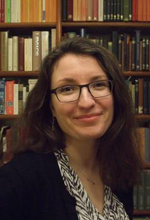Colinda Lindermann, M.A.
Research Assistant within the framework of Dahlem International Network Junior Research Group "Arabic Philology and Textual Practices in the Early Modern Period"

Freie Universität Berlin
Seminar for Semitic and Arabic Studies
Arabic Studies
Research Assistant External Funds
Junior Research Group "Arabic Philology and Textual Practices in the Early Modern Period"
Room -1.1057
141954195 Berlin
Office hours
Donnerstags 14-15 Uhr und Nachvereinbarung via E-Mail
Colinda Lindermann, born in 1982, works as a research assistant within the framework of Dahlem International Network Junior Research Group, under the direction of Prof. Dr. Islam Dayeh and supported by Freie Universität Berlin as part of the Excellence Initiative of Deutsche Forschungsgemeinschaft (DFG).
Professional Career
| Since 2015 |
Research Assistant within the framework of Dahlem International Network |
| 2014-2016 |
Arabic Studies at Freien Universität Berlin; degree: Master of Arts (M.A.). |
| 2009-2014 |
Studies of History and Culture of the Near East at Freie Universität Berlin; |
| 1999-2005 |
Studies of Classics at Universiteit Leiden, Netherlands; degree: doctorandus (M.A.) |
Lecturesin summer 2017
- 14281 Seminar
Scheich und Schüler: Lehre und Wissensvermittlung in der arabisch-islamischen Kultur (Colinda Lindermann)
Zeit: Do 12:00-14:00, zusätzliche Termine siehe LV-Details (Erster Termin: 18.04.2017)
Ort: 1.2058 Seminarraum (Fabeckstr. 23-25)
Lectures in winter 2016/17
- 14281 Seminar
Einführung Semitistik/Arabistik - Die ersten Jahrhunderte der arabischen Sprache und Literatur (Colinda Lindermann)
Zeit: Mi 12:00-14:00, zusätzliche Termine siehe LV-Details (Erster Termin: 19.10.2016)
Ort: 1.2051 Seminarraum (Fabeckstr. 23-25)
Lectures in summer 2016
- 14287 Seminar
Helden, Räuber, Totenklagen: die vorislamische Dichtung (Colinda Lindermann)
Zeit: Di 12:00-14:00 (Erster Termin: 19.04.2016)
Ort: 0.2051 Seminarraum (Fabeckstr. 23-25)
The philological discourse in Arabic lexicography of the early modern period
Arabic lexicography already had a long history when al-Qāmūs al-muṭīṭ of Fīrūzābādī (1414) was published. The compiler of an Arabic dictionary first had to take a stand within a philological debate that goes back to the beginnings of Arabic philology. The Qāmūs' reflection on various aspects of the lexicographical tradition and its main works (including the ḥiḥāḥ of Ǧawharī [died 1008]), in the form of commentaries, adaptations and translations, again provided material for new debates throughout the Arab world and beyond.These debates, which can be traced back to the nineteenth century, were seldom exclusively linguistic, but had political and religious implications. The Arabic national lexicon reveals these ideological aspects of philology.
In her dissertation Colinda Lindermann examines the paradigms of Arabic lexicography early modern times. Central points are the self-understanding and the methodological reflection of the authors, their perception of the philological tradition and the discussions of their works' recipients.
Focus of research
- Lexicography and grammar
- Arabic philology in European Oriental studies
- pre-Islamic poetry